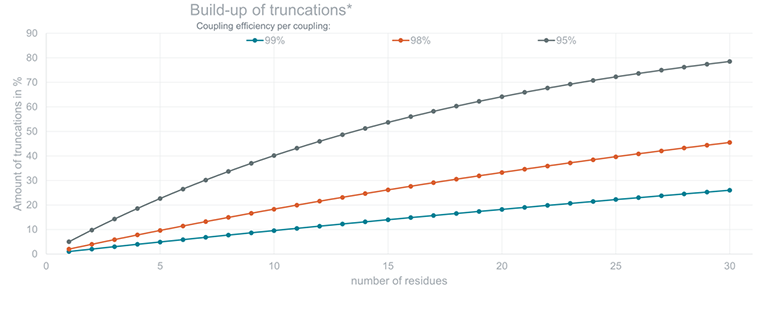Peptide Library Screenings: 5 Reasons Why Crude is Not Enough
.png)
Purified Peptides in Drug Discovery and Screening
Laboratories must use high-quality products to succeed in the early research and development of peptide drugs. This ensures that accurate results are obtained reliably. However, the purity of peptides obtained after synthesis is often insufficient, which requires purification as a necessary step in the peptide lab workflow – a very challenging task when working with multiple peptides or peptide libraries. This blog post will discuss the importance of purified peptides and peptide libraries in drug discovery and screening.
What Are Synthetic Peptides?
Peptides are short protein fragments with a size of more than two amino acids. The precise length at which a peptide becomes a protein by definition is not clearly defined but typically ranges from 40 to 100 amino acids. Peptides are vital in various research applications and drug development processes, particularly in the biopharmaceutical industry. Over 100 peptide-based approved drugs or diagnostics are on the market today.1
Unlike proteins, peptides can be chemically synthesized due to their small size. The primary method is solid-phase peptide synthesis (SPPS) for sequentially coupling the respective amino acids through amide formation between the carbonyl carbon of one to the nitrogen atom of another with formal loss of water. However, the synthesis process yields crude peptides containing impurities like truncations, deletions, solvents, salts, and other organic debris.
As the length of the peptide increases, truncations and deletions become a more significant source of impurities. For instance, if a 30-mer peptide has a coupling efficiency of 99%, over 25% truncations will form.
 *Calculated by: amount of truncations in % = 100 - 100*(0.9X)^n-residues; X: 9, 8, 5
*Calculated by: amount of truncations in % = 100 - 100*(0.9X)^n-residues; X: 9, 8, 5
5 Reasons Why Crude Purity in Early Screenings is Not Enough
1. Assays reliability
Impurities like truncations and other side products (solvents, salts, organic residues) can interfere with your test system and lead to skewed results, making it challenging to draw meaningful conclusions.2 Peptide purification eliminates these contaminants, ensuring a higher level of reliability.
2. Accuracy for Precise Experiments
In drug discovery and screening, precision is paramount to understanding the interactions of peptides with target molecules and their effects in various biological systems. Thus, researchers must work with material accurately representing the sequences they intend to study3. This can only be ensured with a highly selective purification technique to achieve high peak purities.
Maintaining consistency in your research is essential for reproducibility and comparative analysis. Peptides with a clearly defined purity level guarantee that your experiments are conducted with uniform sequences, reducing variability in your data.4 This consistency simplifies the process of replicating experiments and comparing results across different research projects and labs, making your work more efficient and reliable.
4. Cost-Efficiency in the Long RunWhile the purification process may add some initial steps to your research, it can save you time and resources in the long term. Purified peptides reduce the risk of repeated experiments or costly adjustments due to inaccurate results. Investing in purification ultimately pays off by ensuring your research progresses efficiently.
5. Meeting Journal StandardsResearchers often face stringent publication requirements. Peer-reviewed journals demand high-quality peptides to meet their quality standards. By adopting purified peptides in your research, you ensure the integrity of your data and meet these compliance requirements. This enhances the credibility of your research and ensures it aligns with industry best practices.
Concluding remarks
The importance of purified peptides cannot be overstated in the competitive and demanding landscape of peptide screenings and drug discovery. An adequate peptide purity ensures accuracy and consistency, allowing scientists and researchers to conduct experiments confidently. By using purified peptides, you not only provide the integrity of your data but also save time and resources in the long run.
This is why selecting the proper peptide synthesis and purification solutions can make all the difference in your research endeavors. Make purified peptides essential to your drug discovery and screening efforts to achieve new heights. Your path to groundbreaking discoveries begins with the purity and precision of purified peptides.
References:
- Vera D'Aloisio et al., Drug Discov. Today 2021, 26, 1409-1419
- J. W. de Beukelaar et al., Rapid Commun. Mass Spectrom. 2007, 21, 1282-1288
- J. R. Currier et al., Clin. Vaccine Immunol. 2008, 15, 267-276
- A. N. Hofnagel et al., Clin Chem. 2016, 62, 48-69